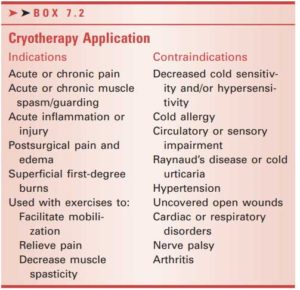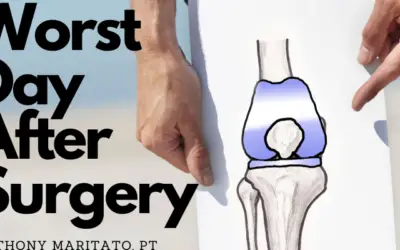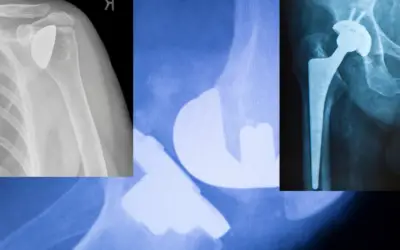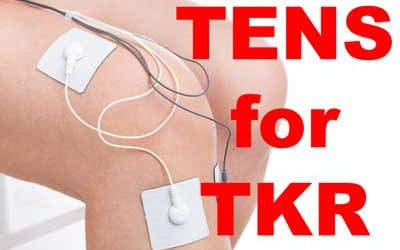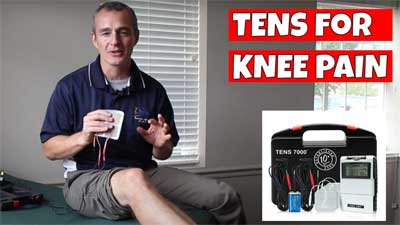How long should I ICE my knee after knee replacement?
Article Updated 06/08/2022
How long should I ice my knee after knee replacement surgery?
After a total knee replacement surgery many surgeons will often recommend icing the knee as often as possible.
In this article, I will review the current myths and misconceptions about using cryotherapy after knee replacement surgery and what is the number 1 reason to consider icing.
3 of the Most Common Myths Around Icing After Surgery:
- Icing reduces inflammation
- Icing reduces swelling
- Icing helps to heal injured tissue
3 Actual Truths Behind Icing After Surgery:
- Cold therapy will numb the superficial nerve endings which may reduce the experience of pain.
- Cold therapy provides a novel stimulus for the central nervous system and may interrupt the transmission of information being perceived as threatening.
- Cold therapy is inexpensive and easy to use at home. It is convenient and provides you with a sense of control which may help empower you to take control of your pain.
What does the research suggest?
A 2007 study determined that only an analgesic effect was demonstrated with continuous cooling. This study also determined that 4 degrees Celsius (39.2 degrees Fahrenheit) was determined to be comfortable for most patients. [1] A 2012 study analyzing the possible benefits of R.I.C.E. was inconclusive. [2]
How long should I place ice on my knee?
According to Therapeutic Modalities “Cryotherapy is usually applied for 20 to 30 minutes for maximum cooling of both superficial and deep tissues.” In many physical therapy clinics, the common recommendation is 10-minutes of sustained application. A couple of considerations to determine the length of time ice is placed on your post-surgical knee include
- How cold is the ice pack?
- Are you placing a piece of cloth or other covering between the ice and your skin?
- Are you applying ice to a part of the body with a thicker fatty tissue layer?
When should an ice pack be avoided?
The following table comes from Therapeutic Modalities section II page 168 –
Myth Buster #1 – Cryotherapy does not reduce inflammation.
Inflammation is a chemical process within the body and is largely regulated by the immune system. Placing an ice pack on the skin to change the skin’s temperature will not significantly impact the chemical response to tissue injury and repair known as inflammation.
Myth Buster #2 – Icing reduces swelling
Swelling and edema are also regulated by chemical changes at the site of injury. Changes in temperature applied to the skin can not significantly change the chemistry deep under the skin. If a noticeable change in swelling is noted upon removal of an ice pack it is largely due to the mechanical compression of the ice pack squeezing the fluid out of the area and not due to the cold temperature of the ice pack.
Myth Buster #3 – Icing improves healing.
Since the healing response is autoregulated by the body’s immune system, changes in superficial skin temperature have not been shown to significantly affect healing times. The best-known evidence of healing tissue following surgery includes a short episode of rest followed by an active recovery guided by a physical therapist, occupational therapist, or other qualified healthcare professional.
Summary:
Based on the available evidence, I would recommend using either cold therapy or heat therapy solely for an analgesic benefit. I would advise against taking time away from a more active recovery to sit with an ice pack or heating pad on your knee. If cold or warmth feels good and helps bring relief between bouts of activity these modalities are generally considered low risk for complications and inexpensive.
The bottom line is to do what feels good while you are resting, but stay active and keep moving when possible.
Facebook Group Comments
Another trick that helped me, was carrying an old fashion ice bag around and keeping ice on my knees all day even while going on excursions. Most restaurants and QT‘s gas station will let you fill up a cup and pour it into your ice bag. This bag CVS
Cited References:

Anthony Maritato, PT
Physical Therapist
Anthony Maritato, PT has been a licensed physical therapist and private practice owner since 2006. Ohio license #PT011602.
Anthony has been passionate about helping patients recover from total knee replacement surgery as well as rotator cuff repair surgery.
About the Author -
Anthony Maritato, PT has been a licensed physical therapist since 2006. He specializes in post surgical care and rehabilitation of total knee replacement and rotator cuff repair surgery.
Mr. Maritato is also nationally recognized as a therapist educator teaching courses related to Medicare reimbursement, contracting, and documentation.
Total Therapy Solutions LLC is Tony's primary practice which he owns with his wife Kathy who is also a licensed physical therapist.
More Blog Posts …
Worst Day After Knee Replacement
What is the worst day after knee replacement? I am a physical therapist who specializes in treating patients after a total knee replacement. In my experience, the worst day after knee replacement is the third day. I will explain why in this article and share some...
What is the most painful joint replacement surgery in 2023
Introduction to Joint Replacement Surgeries Joint replacement surgery is a common and highly effective treatment option for severe pain and functional limitations associated with a variety of joint disorders. This surgical procedure involves replacing a damaged joint...
Bench Press With Shoulder Pain: A Comprehensive Guide
I have been a physical therapist since 2006 and a certified strength coach since 2001. If there is one thing I have learned over the past 22 years it is that pain does not always mean danger or damage. A simple rule of thumb for guiding your decision to stop an...
Surgery Clothes: What to wear for a total knee replacement surgery
Best Surgery Clothes for Before, During, and After your Knee Surgery I have been a licensed physical therapist since 2006 and have worked with hundreds of patients who underwent total knee replacement surgery over the past 16 years. One thing nobody prepares for are...
Muscle Spasm in Shoulder
Understanding and Treating Muscle Spasms in the Shoulder Muscle spasms in the shoulder can be incredibly uncomfortable and can significantly limit your range of motion and daily activities. Whether it's a sudden, involuntary contraction or a persistent tightening of...
Can TENS Unit Cause Heart Attack
Unraveling the World of Can TENS Unit Cause Heart Attack? Transcutaneous Electrical Nerve Stimulation (TENS) units are specialized devices widely used in the medical and physical therapy fields. These handy gadgets function by sending low-voltage electrical currents...
TENS for Knee Pain
Table of Contents TENS Unit for Knee Pain Contraindications for using TENS on Knee Pain Indication for Using TENS on Knee Pain TENS Unit for Knee Pain Transcutaneous Electrical Nerve Stimulation (TENS) is a non-invasive and drug-free method for pain relief that is...
Is foot swelling after knee surgery normal?
Foot swelling after total knee replacement surgery is a common concern among patients. This comprehensive guide will explore the causes of swelling, how to manage and reduce it, and steps to prevent it from occurring. Read on to learn more about foot swelling after...
Pros and Cons of Rooster Comb Injections for Knee Osteoarthritis
Rooster comb injections have become so popular in my area over the past 10 years. Since I am mostly treating patients after a total knee replacement surgery, I see the patients who were not helped by hyaluronic acid injections. In this article I want to share my...
Overcoming Challenges After Total Knee Replacement: A Guide to Recovery and Empowerment
In this article, we'll explore some strategies to help you walk without a limp and manage swelling following a total knee replacement (TKR) surgery. We'll also provide motivational quotes to keep you inspired and hopeful throughout your recovery journey. Motivational...
